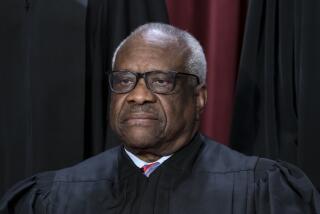Letter May Contradict Conn. Governor
- Share via
HARTFORD, Conn. — Gov. John G. Rowland accepted expensive cigars from a contractor for three years then abruptly stopped in 2001, saying accepting such gifts violated state law, according to documents turned over to federal investigators and reviewed Friday by Associated Press.
The documents seemed to run counter to the governor’s current argument: that the thousands of dollars worth of improvements he accepted to his lakeside cottage did not violate state law.
Rowland is being investigated by the federal government and a state legislative committee to determine if he and state contractors traded favors. The governor has acknowledged receiving gifts from employees and contractors, but has said he gave nothing in return.
On Friday, a day after an antiques dealer said he helped facilitate a sweetheart real estate deal for Rowland, the governor insisted he committed no crimes and did nothing to compromise his office.
“All I’m asking for is due process and an opportunity to tell my side of the story,” Rowland told reporters. “That has not happened yet.”
Kurt Claywell, an electrical subcontractor, told authorities that he gave the governor thousands of dollars worth of cigars and champagne over several years. Associated Press also reviewed notes from Rowland thanking Claywell for the gifts.
But in August 2001 the governor’s office returned a box of cigars to Claywell and enclosed a letter saying such gifts were illegal.
“Under Connecticut law, public officials cannot accept gifts from members of the public if the value exceeds $100,” Assistant Legal Counsel Amy Lazzaro wrote.
Claywell’s lawyer declined to comment Friday.
Rowland’s attorneys are challenging the law cited in Lazzaro’s letter.
Ross Garber, Rowland’s legal counsel, said the governor’s office agrees that no public official can use his position for financial gain. However, the office has taken the position that Rowland can accept gifts from people he considers friends or from contractors who do not perform work for the governor’s office. Garber said the ethics law was “at best ambiguous.”
William F. Dow III, Rowland’s attorney in the federal investigation, said Claywell’s statements provided no evidence that Rowland offered anything in return for the gifts.
Two sources who spoke on condition of anonymity and are close to the case said Claywell contends he met with Rowland’s former co-chief of staff, Peter Ellef, after being turned down for a subcontract on a school. Claywell was then awarded the subcontract, the source said.
Dow said Rowland had no role in awarding Claywell’s contract.
Ellef’s attorney declined to comment.
Associated Press writer Susan Haigh contributed to this report.
More to Read
Sign up for Essential California
The most important California stories and recommendations in your inbox every morning.
You may occasionally receive promotional content from the Los Angeles Times.













